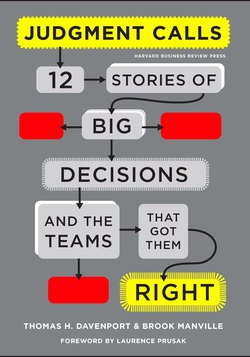Читать книгу Judgment Calls - Thomas H. Davenport - Страница 7
На сайте Литреса книга снята с продажи.
Beyond M&A
ОглавлениеWe could go on and on about poor M&A decisions, and probably many of our readers could, too. The stories become infamous precisely because they are the kinds of “big swings” that make or break reputations, and often bring out the worst in managerial decision making. The merger machinations have to be kept at least somewhat close to the vest, and the rationale for the deal is all rooted in future potential, not past experience (or data based upon it). Therefore such decisions are routinely entrusted to solitary leaders at the top—and they are thus the greatest case against the ability of those solitary leaders to exercise great judgment at the scale of the organization.
But M&A decisions are hardly the only kinds of moves that single-minded enterprises make badly. Missteps occur in every sphere of business and organization—in matters of strategy, innovation, operations, and people—most of which are minor, and some of which have huge consequences.
Strategy making is probably most rife with poor judgment, though the flawed deliberations behind most dumb decisions never come to light. Sins of omission—roads foolishly not taken—surely outnumber sins of commission. When these do become known, they become sources of acute embarrassment, even to leaders long acknowledged to be great, as Ken Olsen, the cofounder and longtime CEO of Digital Equipment Corporation, found out.
Olsen guided the company to dominance of the minicomputer category over its first thirty years.5 As a testament to his vision, Digital became the second-largest computer company in the world after IBM. But by the mid-1980s, it became obvious to most observers that the world was moving on to personal computers.
Not to Olsen, however. He doggedly maintained that the mini remained the next big thing. His words are amusing at this point: “Customers don't want a computer that sits on a desk. Customers want computers that sit on the floor.”6 Even if they did want computing on their desktops, Olsen argued that “most people in an organization want terminals.”7 Olsen also stuck by Digital's proprietary VMS operating system while the rest of the world shifted to Unix and Windows.
With a leader with his head in the sand, Digital couldn't stay in business for long. By 1998 the company was sold to Compaq for $9.6 billion, well below its peak annual revenues of $14 billion.
Olsen was surely not the first great industrialist who erred by believing his gut was unimpeachable and his vision reliable. Henry Ford, who built one of the world's largest and most successful car companies, committed his share of bad judgment, though he obviously also made numerous good decisions. He perfected the assembly line, virtually defined vertical integration, and doubled the wages of his workforce to $5 a day, thus making them much more loyal as employees and consumers of his cars. But Ford also made some truly awful decisions. He stopped improving the Model T, declaring it “already correct” and the only car anyone could ever need—and it rapidly lost market share in the 1920s. He decided to build a prefabricated industrial city in the rain forest of Brazil that he called Fordlandia, intending it to be a cheap source of cultivated rubber for tires. But according to historian Greg Grandin, Ford was too distrustful of experts to consult even one on the subject of rubber trees.8 It was an agricultural and social disaster, was sold at a $20 million loss, and rotted in the jungle. Worst of all, he allowed his name to be used for anti-Semitic causes and arguments, and met with associates of Hitler from Germany.
Even the late Steve Jobs of Apple, the contemporary decision maker most acclaimed for his golden touch over the last decade or so, had moments when his judgment failed him. In the 1980s, he hired John Sculley to succeed him as CEO of Apple, and Sculley presided over a period of slow growth and product missteps in the ensuing years. Jobs later commented, “What can I say? I hired the wrong guy. He destroyed everything I spent 10 years working for, starting with me.”9 Jobs sold all of his Apple stock when Sculley pushed him out, which cost him billions. Few would call Next Computer, the start-up he founded during his hiatus from Apple, a success. And when he came back as CEO, he allowed the backdating of stock options. Jobs certainly redeemed himself with a string of fantastically successful products from Apple—and as one of the company's founders, he got a bit of slack for a bad call now and then—but he was hardly immune to faulty judgment. One factor that Jobs attributes his good decisions to was greater reliance upon others. In a summary of a 1997 interview, a New York Times article published after he resigned for health reasons in 2011 noted:
In his early years at Apple, before he was forced out in 1985, Mr. Jobs was notoriously hands-on, meddling with details and berating colleagues. But later, first at Pixar, the computer-animation studio he co-founded, and in his second stint at Apple, he relied more on others, listening more and trusting members of his design and business teams.10
